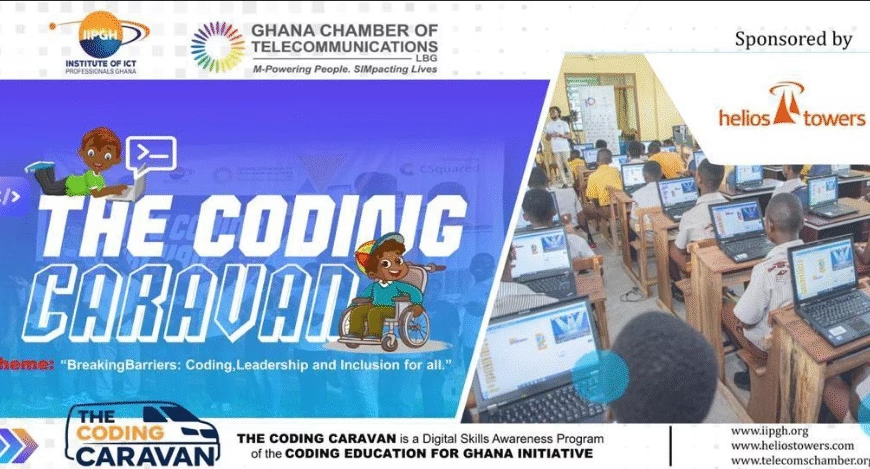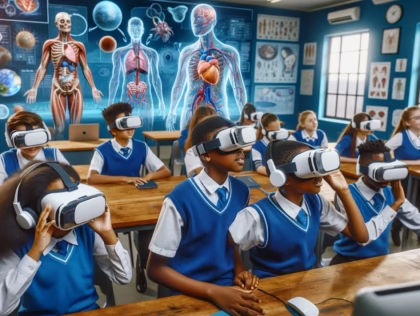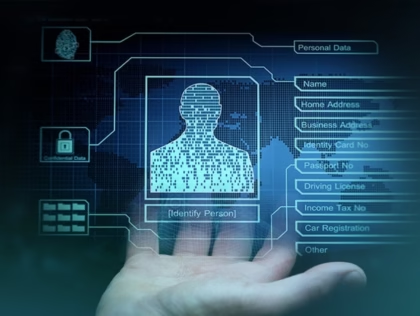Inclusion took center stage on July 11, 2025, as 120 students and 15 teachers at the Demonstration School for the Deaf, Mampong-Akwapem experienced a full-day digital skills training workshop like never before. This landmark event, organized by the Institute of ICT Professionals Ghana (IIPGH) in partnership with the Ghana Chamber of Telecommunications and sponsored by Helios Towers Ghana, marked a significant milestone in bridging digital gaps for Ghana’s deaf community.
This was a training program marked by intentionality, preparation, and empathy.
The Journey to Inclusion
The seeds for this groundbreaking initiative were planted a year ago. Though originally scheduled for 2024, the workshop was postponed due to funding constraints. That delay, however, only strengthened the organizers’ resolve.
Determined to ensure a truly impactful and inclusive experience, the team consulted the Department of Assistive Technology at the University of Ghana. Special thanks go to Mr. Alexander Bankole Williams and Ing. Francis Kwabena Boachie, whose expertise guided the planning process. They provided vital insights into working with students with disabilities, especially those with hearing impairments.
Additionally, during our consultations at the Akwapem School for the Blind, one of the most striking revelations we uncovered was the significant disparity in access to technology skills training between students with disabilities and their peers without disabilities. We learned that as students with disabilities progress through their academic journey, they are increasingly less likely to engage in digital skills training, particularly in science and mathematics. This trend suggests a troubling pattern: the higher a student with a disability climbs in grade level, the more likely they are to disengage or drop out of school entirely. It was a deeply humbling insight that further emphasized the urgent need for inclusive and sustained interventions.
These consultations also revealed crucial considerations – for instance, the inability of visually impaired students to use the Scratch platform due to its incompatibility with screen readers.
As a result, the team made the strategic decision to start with the deaf community and work toward a better-tailored experience for blind students in a future caravan.
Prepping the Ground: Teachers First
In the latter part of 2024, a virtual introduction to Scratch was held for the teachers of the Demonstration School for the Deaf. Though the remote session wasn’t ideal, it created awareness and interest.
Fast forward to the in-person session in 2025, the day began with an in-depth Train-the-Trainer session. Teachers were introduced to Scratch, Internet of Things (IoT), and 3D Design and Printing. This session equipped them with practical knowledge and ensured they could reinforce students’ learning even after the caravan team had departed.
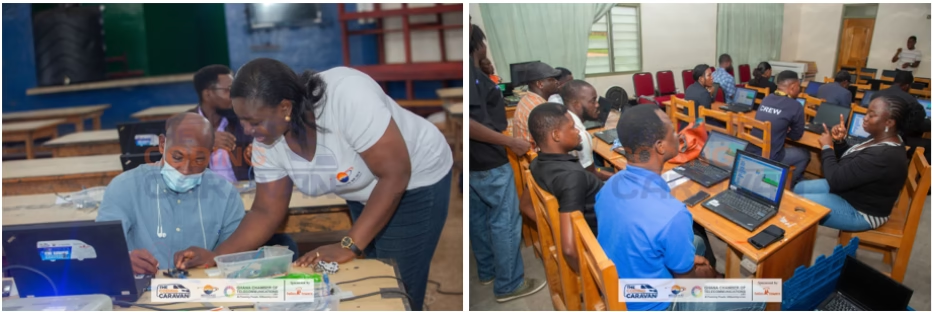
Teachers at the Demonstration School for the Deaf undergoing Train-the-Trainer Session
One of the key takeaways was shared by the school: they had begun integrating Scratch into their lessons after the virtual training, which was a clear sign of progress and ownership.
The students were split into two groups for the day’s activities.
One group explored animation with Scratch. They were introduced to the Scratch interface and guided through creating a simple animation of a character taking a walk on a sunny day. Along the way, they picked up basic coding concepts like loops, conditions, and sequencing. The excitement in the room was palpable – hands shot up eagerly, signing rapidly to answer questions, as they watched their ideas come to life on screen.
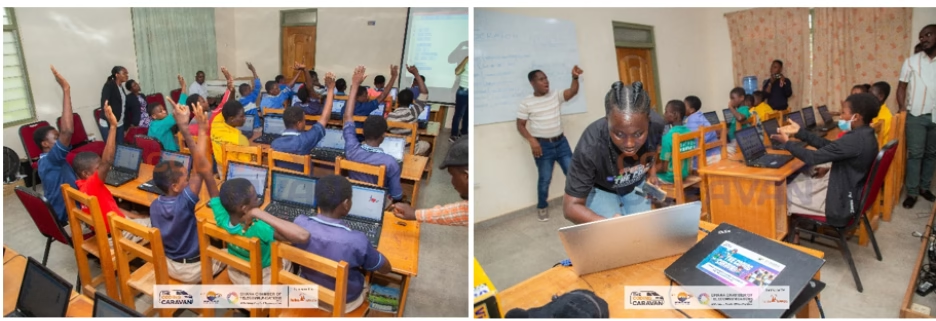
A cross section of students learning Scratch
The second group dove into the Internet of Things (IoT) with a LED on-and-off project. After a brief introduction to IoT, they learned how to control a red LED, then successfully replicated the process with yellow and green LEDs. Their curiosity and quick grasp of the concepts were evident in how they confidently handled the task.
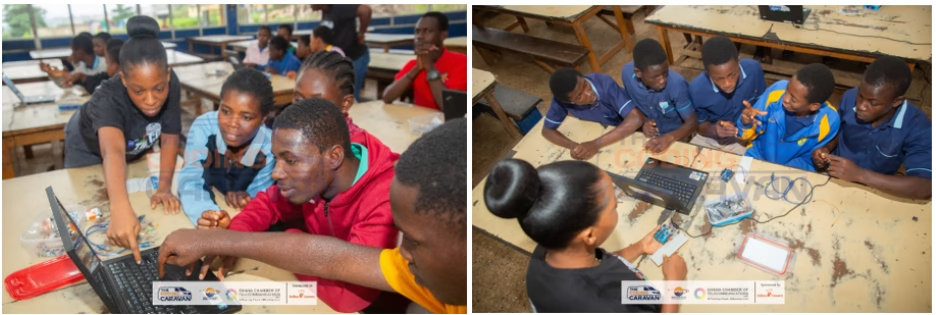
A cross section of students learning Internet of Things
They then moved on to 3D Design – watching a live 3D printing demonstration and learning the step-by-step process. The smiles and nods said it all: they were engaged, they understood, and they were proud of what they had achieved.
With the right opportunities and support, these students showed the same creativity, problem-solving, and technical skill as any other group of learners.
As one facilitator put it:
“Before I even finished explaining, they were already coding. I was shocked. Their pace and grasp were amazing.”
Instructors who initially wondered how they’d communicate effectively with deaf students were blown away by their attention to detail, speed of learning, and sheer brilliance.
Testimonials from organizers & participants
“This was my first time teaching hearing-impaired students, and they left me speechless. They’re sharp, focused, and incredibly capable. Disability truly is not inability.”
Dorothy Klutse, Instructor, IIPGH
“For the first time, I saw my students sit for more than three hours without fidgeting, because they were finally having materials they can interact with.”
Divine, Assistant Headmaster Admin, Demonstration School for the Deaf
“I want to work with Television sets, LED boards and electronics gadgets, refrigerators and computers in the future.”
Abigail, Student, Demonstration School for the Deaf
This workshop provided basic Coding skills, dignity, visibility, and empowerment.
The Bigger Picture
This initiative is part of a broader strategy by IIPGH and partners to deliver coding education across all 16 regions of Ghana, including underserved and special needs communities.
Through strategic partnerships with schools, development partners, and local education authorities, the goal is clear: no learner should be left behind in the digital revolution.
“One of our strategies is to develop a local curriculum that will be delivered in sign language and other inclusive formats. We envision the Coding Caravan reaching all 16 regions in Ghana through strategic partnerships with government agencies, local education authorities and development partners especially with focus on underserved and special needs areas.”
Gifty Mottey, Director of Administration, Institute of ICT Professionals Ghana
A Call to Action
The success of this event has made one thing abundantly clear: inclusive digital education is not only possible – it is essential.
However, more support is needed. From accessible devices and laptops to inclusive curriculums and tailored learning materials, this is a collaborative mission.
This is the time for corporate Ghana, NGOs, and individuals to come on board.
Let’s create a Ghana where every child, no matter their ability, is equipped for the digital future.
Digital Skills for Demonstration School for the Deaf (Coding Caravan 2025)

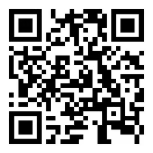
For more information or to support similar events, please email IIPGH on info@iipgh.org or call 0541001965.
The Institute of ICT Professionals, Ghana (IIPGH) is a professional association made up of professionals in various domains of Information and Communication Technology (ICT) practice. Some services offered include Digital Skills Education, ICT Consultancy and Solutions for Business, Curriculum Reviews for Educational Institutions, IT Human Resource Provision, among others. Visit our website – https://iipgh.org/ to learn more.
Author:
Deborah Ofori-Dartey | Digital Skills Training Supervisor | Member, IIPGH
For comments, contact deborah.dartey@iipgh.org or info@iipgh.org.

